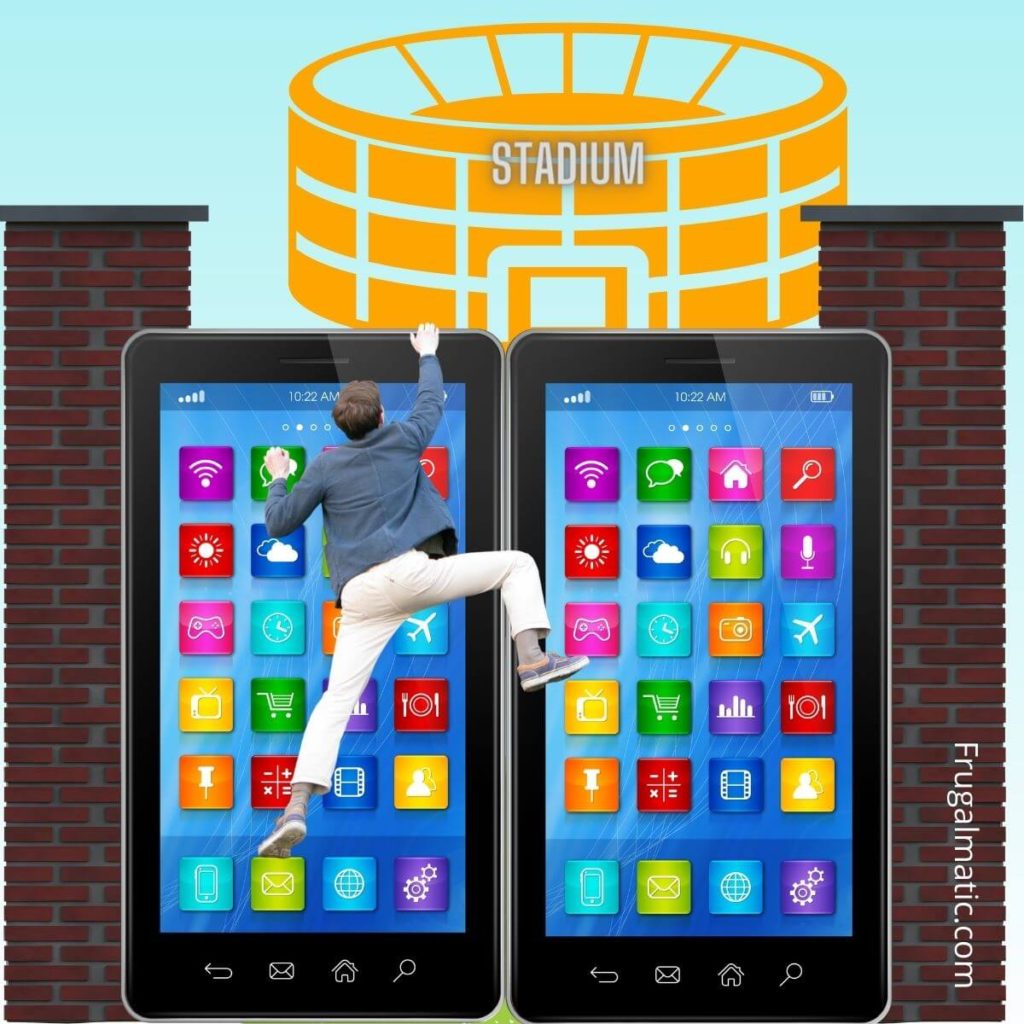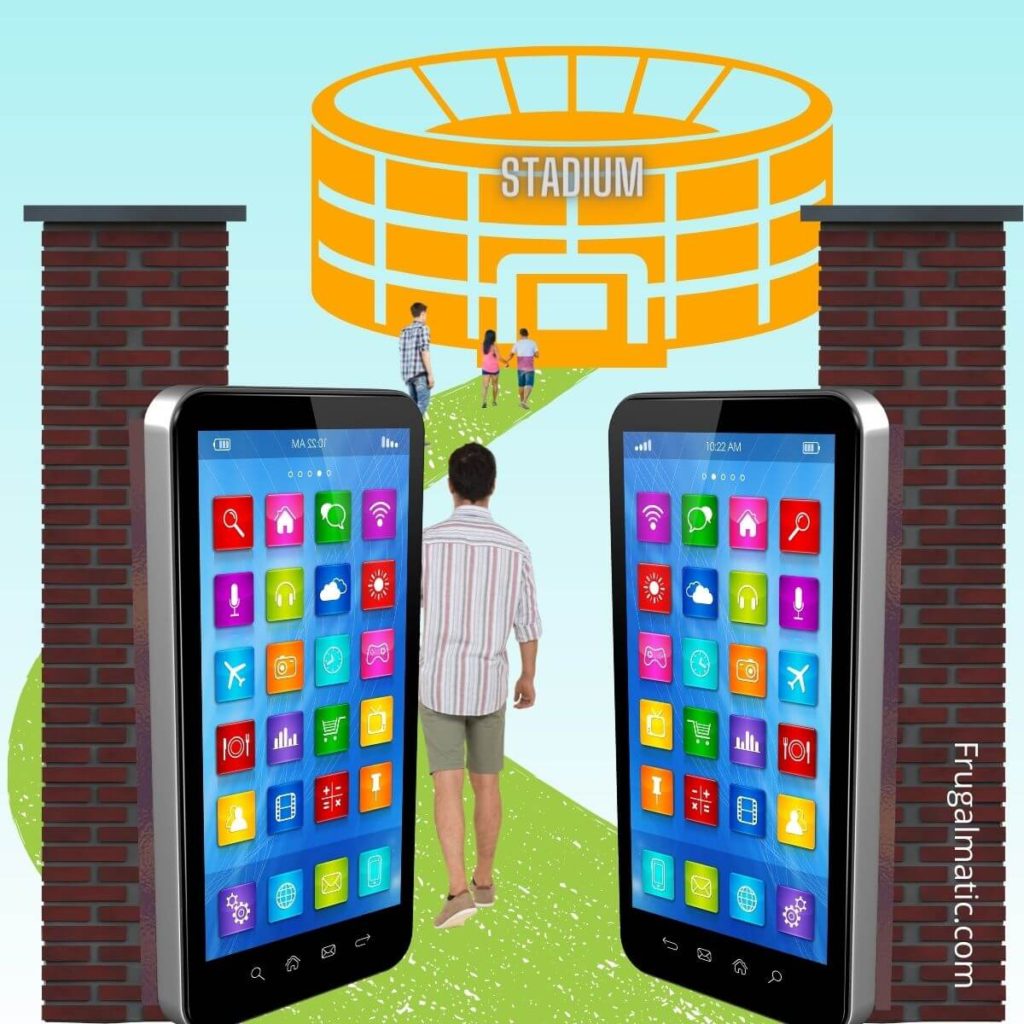This post was last updated on November 4th, 2023 at 08:11 am
As a flip-phone/dumb-phone user, I’ve grown frustrated lately with emergence of “gates” that make it difficult to access certain services without needing to use a smartphone. These gates, such as e-ticketing for sport events and concerts, existed before the pandemic but seem to have multiplied in recent months. The challenge for digital minimalists is to get around them without being forced to use a smartphone full time. In this post, I offer some practical tips to keep your digital minimalist goals on track.
People who constantly use and carry around a smartphone often seem unaware of the proliferation of these gates. They spend so much time on their devices that needing them to make purchases or activate services is a perfectly logical, natural part of their consumer experience. They’re often happy to become more dependent on their devices, and they’re oblivious to the potential consequences of tying the economy, society, and their personal finances to a bunch of apps. Digital minimalists recognize these consequences. Yet, most of them didn’t switch to dumb phones because they wanted to be excluded from in-person, live events.
Digital gates blocking more everyday activities
The problem isn’t just e-ticketing. I’m also hearing about other day-to-day activities linked to smartphone apps. Indeed, I encountered one two weeks ago when I took one of our kids to an orthodontist appointment. In explaining how the orthodontist monitors the placement of braces, an assistant showed us a device that attaches to a smartphone and then scans your teeth and braces. I didn’t fess up to not having a smartphone because my wife has one. We could use hers.
At the same time, I realize I can’t ask my wife to use her smartphone every time I encounter a situation requiring one. Over the next several years, I’m likely to run into more situations gated by smartphones. Here is a list of other everyday activities that sometimes require a smartphone to access.
- Parking spots.
- Use of certain facilities, such as laundromats.
- Confirmation of COVID vaccination status or COVID test results.
- Identity authentication.
- Information linked to QR codes, such as restaurant menus.
When I recently described my concerns on some Reddit forums about digital minimalism, some people were dismissive and insisted workarounds existed for all or nearly all of these situations. But as time goes on, I fear some of these workarounds will disappear.
Digital gates vs. smartphone convenience
In these discussion threads, I also noticed some people confused digital gates and personal preferences. Certain smartphone features don’t act as gates but as conveniences, such as GPS navigation. These features make life easier, but you don’t need to use them to access something else. You can, for example, use paper maps instead of GPS. Also, some people feel they need to carry a camera everywhere to document their life, but it’s not necessary. I’ve even heard some people claim they “need” an iPhone because only iPhone users have blue text message bubbles. You might feel socially excluded, but you’re not physically prevented from accessing a service because you have a green text message bubble.
What I’m talking about is being denied access to an event or service or the ability to make a payment because you lack a specific form of technology. That’s different from feeling inconvenienced by having to use a paper map. It’s different than feeling left out because you’re the only one in the room who isn’t photographing your child’s fifth-place finish in the YMCA basketball tournament. I’m talking about the rearrangement of society—the constant herding of people through digital gates and the exclusion of anyone without a “key.”


5 ways to deal with digital gates
How do you get around digital gates with a dumb phone? This question is important especially for people who are trying to give up their smartphones in an effort to spend more time off-line. This group is vulnerable to returning to full-time smartphone use unless they’re intentional about navigating these digital gates. Here are my five tips for getting around these gates:
01 Avoid switching SIM cards if possible
An obvious solution to these problems is to remove the SIM card from your dumb phone and put it into a smartphone with the intention of returning the SIM card to the dumb phone after getting through the digital gate blocking you. My biggest concern with this tactic is the temptation to simply leave the SIM card in your smartphone and not return it to your dumb phone. If you’re like me and don’t like monkeying with SIM cards, this option should be avoided if there’s another way.
02 Force company managers to tear down those gates
This is my personal favorite. During the transition to an all-digital world, analog alternatives should remain plentiful, perhaps for the next decade. For example, if a restaurant gives you a QR-code menu, you can ask the waiter for a paper version. They probably have a stash. When I mentioned my orthodontist experience on the Reddit forum, someone suggested I just tell them I don’t have a smartphone and ask to do face-to-face checkups. That’s a reasonable ask. If you make clear you don’t have a smartphone, many businesses won’t want to lose you as a customer. They’ll likely unveil the analog solution.
03 Turn your dumb phone into a hotspot
The benefit of using a hotspot is it allows you to keep your SIM card in your dumb phone. By turning your dumb phone into a hotspot, you can provide internet access to a smartphone or tablet, which you can then use to access a QR code or present an e-ticket at an event. However, not all dumb phones possess hotspot capabilities. You can find which phones have hotspots by using a nifty tool created by digital minimalist Jose Briones, who’s reviewed dozens of different dumb phones. If you’re in the market for a new dumb phone, I also recommend checking out his YouTube channel.
04 Consider trading your smartphone for a tablet
When I recently asked a group of Light Phone users how to limit smartphone use, one person told me he traded his smartphone for an iPad, placing a SIM card in the iPad. “That way I have an internet-connected device if I need it, but because of the size I’m not tempted to take it with me everywhere I go,” Thomas Wilde told me. “The fact that when I do bring the iPad with me it stays in my bag rather than my front pocket makes a huge difference. Plus, the awkwardness of pulling out a tablet on the bus or at a coffee shop is enough to keep me from being sucked in.” He also has a SIM card (but no data plan) for his Light Phone II, which he only uses for calling and texting. I like how Wilde has turned his iPad into a limitation, making it easier for him to practice digital minimalism.
05 Simply go without
When the Green Bay Packers switched to e-ticketing last year, my solution was simply not to go to any games. I either watched them on TV or listened on the radio. Likewise, if a restaurant only offers menus via QR codes, a solution would be to opt for a different restaurant (or cook more meals at home). There are limits to such boycotts, however, such as with COVID testing requirements at some universities. You’re not likely to give up your college career over the use of a smartphone app. If you decide to boycott a business because of a digital gate, make sure to let them know why they’re losing your business. Make them realize erecting digital gates could come at a cost. Maybe they won’t care, but if enough customers complain, they might make available an analog alternative.
Read: This phone is so dumb, it’s brilliant
When you can no longer ‘simply go without’
As consumers encounter more of these gates, avoiding them could become impractical and potentially costly. I imagine I’ll come to a moment like I did in 2012 when I bought my first flip phone. At that point, I realized public pay phones had completely disappeared. The only way for me to contact someone in a public setting was to ask someone else to borrow their phone. I couldn’t stand the thought, and so I humbled myself and bought a little LG flip phone, which I then used for the next seven years.
In a similar way, access to everyday activities—from shopping to eating out—is likely to become a headache for anyone without a smartphone. And if you doubt it, consider that few people in 1990 were predicting the demise of public pay phones. Technology has a way of destroying economic and social norms and quickly creating new ones.
I suspect the next wave of disruption will be powered by 5G or 6G networks, in combination with ultra-wideband (UWB) technology. These technologies could make seamless the linking of smartphones and other internet-connected devices. Some of these gates might be literal, such as access to office buildings or events. Other gates might be tied more closely to the terms of certain services, such as with my orthodontist example or needing an app to monitor your driving habits to obtain car insurance. It’s difficult to predict how exactly these gates will manifest.
Read: Are you using healthy tech? 5 questions to ask yourself
Digital minimalism for the most dedicated
Having to use a smartphone won’t spell doom for digital minimalism. However, being a digital minimalist in a smartphone-operated world will require even greater discipline and intentionality. Companies will use these gates to collect data and try to manipulate their customers through social media and other channels. The next leap in mobile technology will make being a digital minimalist more difficult than ever. But for those who find ways to navigate this new terrain—whether wielding a dumb phone or smartphone—the rewards will be immense. The future digital minimalist will the see the world from his own unique perspective, not some tech companies’ manufactured version of reality.

